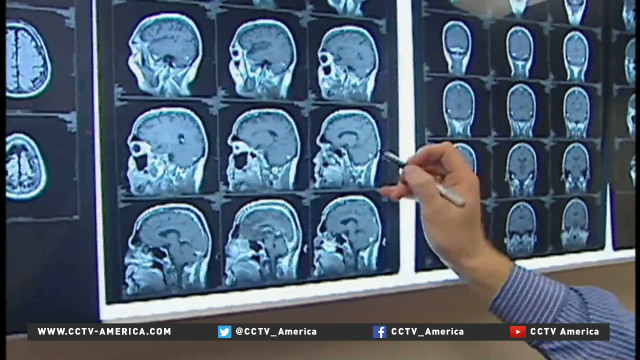Supporters of Artificial Intelligence (A.I.) have said it holds a lot of promise in a wide field, including medicine and education. Some are warning “research” needs to be reined in.
Renowned scientists and researchers warned of AI’s potential dangers to humanity. CCTV America ‘s Mark Niu reported this story from Silicon Valley.
The field of study known as artificial intelligence is creating controversy in the world of technology. Recently, Stephen Hawking, Elon Musk, researchers from Google and researchers from the Massachusetts Institute of Technology all signed a letter warning of A.I.’s potential dangers. The letter also advises research to focus on the benefits to society.

They are essentially algorithms inspired by the way neurons work in the human brain.
But Artificial Intelligence and its branch called Deep Learning has evolved so quickly in the past few years that scientist Stephen Hawking said “The development of full artificial intelligence could spell the end of the human race.”
Technology Tycoon Elon Musk referred to A.I. as a demon the world is provoking.
“With Artificial Intelligence, we are summoning the demon,” Musk said.
Hollywood is finding Artificial Intelligence, or A.I., a gold mine for material. In the Warner Bro’s film, Transcendence, a scientist’s drive for AI leads to the uploading of his consciousness.
In the award-winning film “Her,” a writer falls in love with an operating system fueled by A.I.
In Silicon Valley, Venture capitalists are also falling for A.I. with such numerous startups pushing the bounds of the field.
Neuroscientist and Computer Scientist Naveen Rao founded his company, Nervana, which seeks to build a platform for AI to solve real world problems.
“We’re actually able to exceed human capability in a number of already new problem areas like image categorization [edit] That’s kind of a problem we’d usually say humans are very good at and machines very bad at, now we are actually doing better with machines than we are with humans,” Naveen Rao, Co-Founder & CEO, Nervana said. “We’re moving to more and more areas this is happening, so I suspect in the next 10 or 15 years humans are going to be losing at most of these tasks. Laugh.”
Rao said the computers are still a long way from thinking like a human, especially lacking the ability to estimate or integrate multiple senses, but Rao believes AI can someday revolutionize medicine.
“For example, a doctor reading an X-ray, an MRI. There are many ways a doctor can make an error. It takes years of experience where you get to a point where you are pretty confident you are not making an error,” Rao said. “We can apply that same level of expertise. That doctor that took 25 years to train, to get good at that image analysis, we can actually encapsulate that into a computer and apply that to everyone.”
In Silicon Valley, big tech companies like Google and Facebook have all invested heavily in A.I. In fact both companies have hired pioneers in the field of A.I. to lead their research.
Baidu has created an A.I. lab in Silicon Valley, headed by Stanford Professor and former founder of Google’s Deep Learning Project Andrew Ng.
One of Ng’s students is Richard Socher, who shortly after finishing his Ph.D, raised $8-million in venture capital funding for his A.I. startup, MetaMind.
Socher vastly expanded a concept called recursive neural network, which allows for better understanding of language, and in this case, sentiment.
Natsot break: Richard showing demo on screen says 4939 :46 “Recursive neural network tries to understand the grammatical structure of the sentence— realizes wit, caring, cleverness — these are all positive things, but once you say it doesn’t care about it, then it puts a very high probability on this being negative.”
“There is no conscience in any of those algorithms at all, so our fears are definitely unwarranted,”Richard Socher, CTO & Co-Founder, MetaMind said. “Really tough ones to crack are in natural language understanding. Irony or sarcasm are a very tricky bit if you wanna get to a high level.
MetaMind has taken the unusual step of making Deep Learning available to anyone on its website. Just upload a data set of photos, and MetaMind has learned to classify them instantly with near human accuracy.
“Personally, I would never want to work on using natural language understanding to more efficiently spy on people or using computer vision to try to automatically track targets and then try to shoot them. That being said, it is general purpose technology, and anybody can try to use it and apply it to different things. I do think it’s good to have ethical standards for the near term realistic applications for example in military or medical applications.”
One big concern is whether A.I. will replace human jobs, something Professor Ken Goldberg says is already happening as computers better recognize speech.
“There are a lot of jobs being lost at call centers and I think that again there are so many things that humans are still going to be very, very needed for, and that human interaction, that ability to communicate, that ability to pick up subtle nuances to make judgment calls that there’s still plenty of works for humans to do,” Ken Goldberg, Robotics Professor, UC Berkeley.
For now, it’s widely believed the major tech companies have humans using A.I. to work on predicting what customers want before they even think of it.
But startups like Nervana and MetaMind cite medicine and agriculture as two areas that excite them most.
They believe in deep learning’s potential to accurately diagnose disease and maximize food production – far more than predictions of A.I. making human thought obsolete.

 CGTN America
CGTN America
